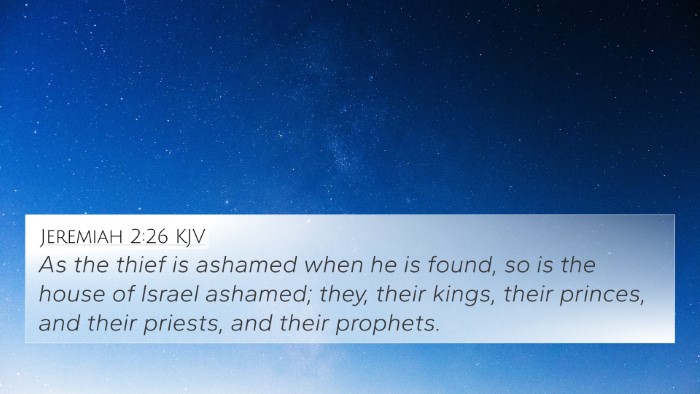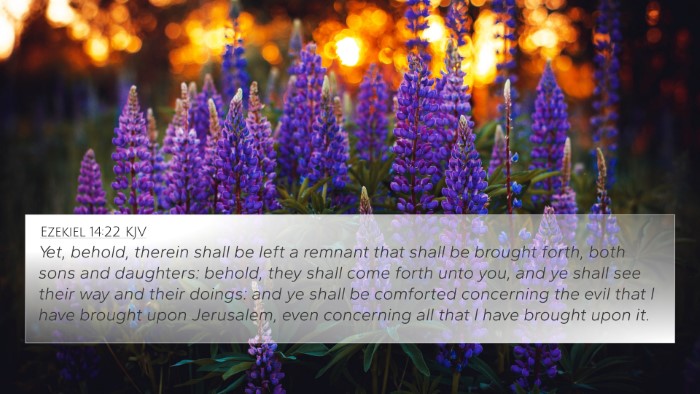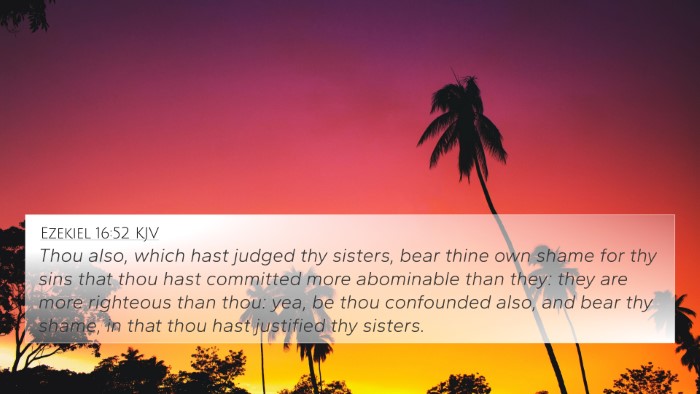Ezekiel 16:54 - Summary and Interpretation
Bible Verse: "So that thou mayest bear thy own shame, and mayest be confounded in all that thou hast done, in that thou art a comfort unto them." - Ezekiel 16:54
Meaning and Insights
This verse from Ezekiel encapsulates a moment of reflection and consequence. It portrays the idea that the people of Jerusalem, represented as a woman, are to bear their own shame due to their actions which have led to their downfall. The verse emphasizes accountability and the realization of their disgrace in the eyes of the nations around them.
-
Matthew Henry:
Henry explains that this verse emphasizes the shame that results from idolatry and unfaithfulness to God. The image of being "comforting" to other nations illustrates how one can become a source of embarrassment and sorrow to others due to their own sins.
-
Albert Barnes:
Barnes offers a theological perspective indicating that true repentance involves understanding the consequences of one’s actions. He brings to light the significance of shame as a necessary condition for genuine remorse and restoration.
-
Adam Clarke:
Clarke explores the implications of the verse in the context of God's covenant with His people. He stresses that this acknowledgment of shame is essential in recognizing the depths of their transgressions and the necessity of returning to God's grace.
Cross-References to Ezekiel 16:54
Understanding how Ezekiel 16:54 connects with other scriptures enriches its interpretation. Here are some relevant cross-references:
- Ezekiel 23:49: Discusses the shame and retribution faced by Jerusalem due to her unfaithfulness.
- Isaiah 47:3: Prophecies concerning the shame of Babylon for her pride and destruction.
- Lamentations 1:8: Directs the readers' attention to Jerusalem's desolation and shame.
- Jeremiah 3:25: Highlights the theme of shame in relation to Israel’s transgressions.
- James 4:9: Calls believers to mourn and weep over their sinful states.
- Revelation 3:17: Illustrates the danger of self-deception concerning spiritual condition.
- Matthew 23:37-39: Jesus laments over Jerusalem, expressing similar themes of rejection and shame.
- Romans 6:21: Questions the fruit of their shame, emphasizing the shame associated with sin.
- Psalm 44:15-16: Describes the reproach faced by God’s people among the nations.
- 1 John 1:9: Provides hope and the assurance of forgiveness upon confession of sins.
Understanding Cross-Referencing in Bible Study
In studying the Bible, utilizing tools for Bible cross-referencing can deepen one’s understanding of scripture:
- Bible Concordance: A valuable resource for locating verses and understanding their connections.
- Bible Cross-Reference Guide: A tool designed to help in linking Bible scriptures and exploring thematic connections.
- How to Use Bible Cross-References: This involves identifying verses that relate to each other and comprehensively investigating these links.
- Bible Reference Resources: Critical in locating the thematic Bible verse connections throughout scripture.
- Cross-Referencing Bible Study Methods: Techniques designed to enhance one’s grasp of connections across both the Old and New Testament.
Concluding Thoughts
The exploration of Ezekiel 16:54 reveals profound truths about accountability and the nature of shame in the light of sin. Understanding cross-references enhances comprehension of inter-Biblical dialogues and can significantly aid in sermon preparation or personal study. The thematic exploration of this verse allows for deep introspection and illustrates the importance of recognizing the consequences of spiritual unfaithfulness.







